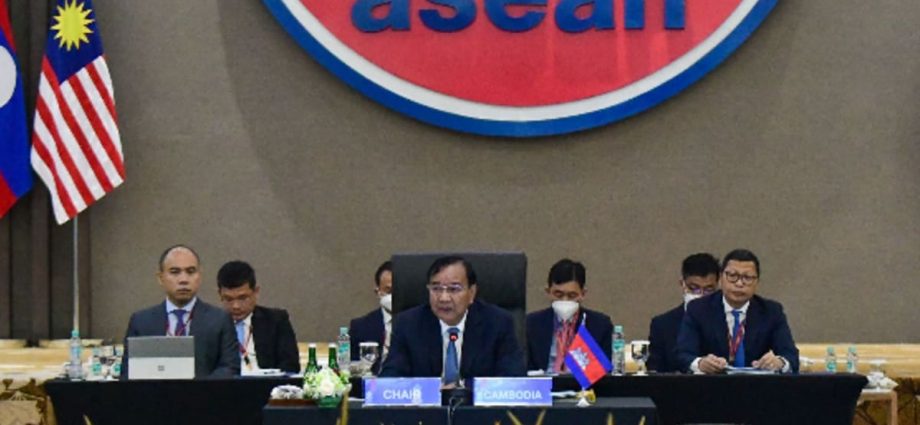
Indonesia and Cambodia have said that expulsion was not discussed at the meeting.
Myanmar is already facing restrictions within ASEAN, with its generals barred from high-level meetings since last year. The country was invited to send a non-political official to the special meeting on Thursday but the junta refused.
Malaysia’s foreign minister Saifuddin Abdullah said he is pushing for Myanmar to be excluded and suspended from all ASEAN meetings if no progress is made.
SPECIAL ENVOY POSTPONES THIRD VISIT
ASEAN Special Envoy Prak Sokhonn – who is also Cambodian deputy prime minister and foreign affairs minister – told CNA his third visit to Myanmar would now take place after the ASEAN Summit in November.
Mr Sokhonn had earlier said the third visit would be scheduled before the summit, but that commitment was made before the Myanmar military executed four political prisoners in July – a move which angered the international community, including current ASEAN chairman Hun Sen.
Mr Hun Sen had warned the Myanmar military during the ASEAN Foreign Ministers’ Meeting in Phnom Penh that the bloc would have to “rethink” its approach to Myanmar if more political executions were carried out.
The bloc also issued a communique during the meeting that effectively gave the Myanmar army up to November to show progress made on the agreed peace plan.
The communique cited Article 20 of the ASEAN Charter, which allows leaders to make decisions at the summit level without a consensus.
GROWING PRESSURE ON ASEAN
The US earlier called for strong action coming out of the Jakarta meeting.
Advocacy group Human Rights Watch slammed the two-page statement issued by ASEAN Chair Cambodia following the talks, viewing it as a failure by the bloc to act on Myanmar.
Assoc Prof Tay said the United Nations and other major world powers will likely continue to put pressure on ASEAN to force Myanmar to show progress.
However, he said that the situation in Myanmar is too difficult for ASEAN to deal with alone, calling it a “global failure” if powerful nations, particularly those in Asia, do not band together to press the military junta for progress.
While major powers like the US could have more influence or capacity in dialogues with Myanmar, the military junta has a history of not responding well to sanctions, Emeritus Professor Damien Kingsbury told CNA’s Asia First on Thursday.
“It’s important to note that the Myanmar military has not ever responded to the external pressure favourably and it does have the very solid backing of China, which means it is largely immune to foreign pressure,” said the emeritus professor from Deakin University’s school of humanities and social sciences.
BLEAK OUTLOOK
Following the meeting, ASEAN foreign ministers will now submit proposals for the bloc’s leaders to decide their next steps on Myanmar at the ASEAN Summit in Cambodia next month.
Leaders will assess Myanmar’s progress and possibly decide on measures against the country without a consensus.
However, Emeritus Professor Kingsbury painted a bleak picture going forward, stating: “I don’t see Myanmar going back to any sort of democratic process any time soon.”
A general election, expected to be held next year, will undoubtedly produce a preordained result, he said. The National League for Democracy (NLD), led by Nobel laureate Aung San Suu Kyi, will likely be barred from standing, he added.
“Realistically, if we want to see the Tatmadaw pushed from power, it’s only going to be by arming the separatist groups or the pro-democratic groups in the country,” said Emeritus Professor Kingsbury.
Assoc Prof Tay added that conditions need to be set for dialogue, with compromise from various parties to forward the peace process.
“It must go back to an effort diplomatically using sanctions as well as incentives to create the conditions for an internal dialogue, and hope the outside world and the inside leaders see the need for some sort of compromise for the betterment of the people of Myanmar,” he said.

